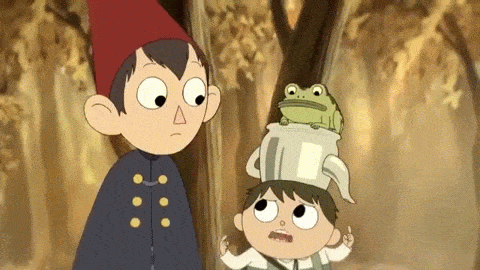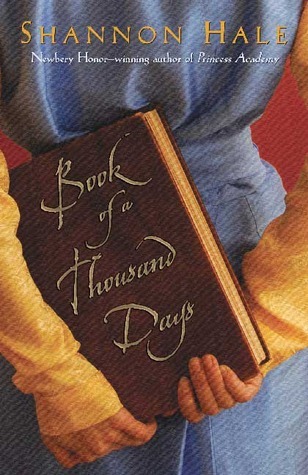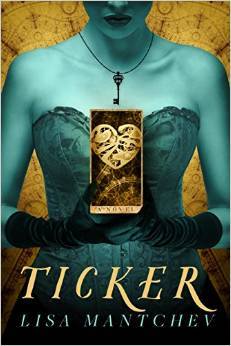I probably scared you all for a little while there, but after an inadvertent and lengthy hiatus from blogging, I'm back (and as overenthusiastic as ever)! I'm returning with a bookish tag post, an endeavor made possible by the inimitable
Alyssa @ The Devil Orders Takeout.
(I have a bit of a backlog, so I'm going to try and spread out tags and do them one at a time! They're also going to be super out of order.)
Presenting the Bedtime Book Tag
Alyssa has tagged me for the Bedtime Book Tag! I'm rather unlike Alyssa in that I do not sleep. It takes me at least twenty to thirty minutes to fall asleep every single night, and even then, I'm incapable of sleeping in past around 8:30 in the morning. It's certainly a struggle, and it may be an unfortunate contributing factor to my short stature.
That said, here is the tag in all its sleepy and not-so-sleepy glory.
1. A book that kept you up all night.
 |
| this series has the best covers. no one can convince me otherwise |
Funnily enough, I don't actually stay up late reading books. (I stay up late doing rather less exciting things, unfortunately. Like homework, because it turns out that I have responsibilities.) But I did once get up at 4:00 am, completely of my own accord, without even setting an alarm, because I
needed to finish Leigh Bardugo's
Siege and Storm, the second book of the Grisha Trilogy. If you know me, you know that
Siege and Storm was my absolute favorite of the series, because it was flawless, and also NIKOLAI LANTSOV, MY LOVE. And Alina being the force of nature she is and so much thought-provoking subtext about the handling of power and gorgeous writing and rich worldbuilding and—
Siege and Storm pretty much wrecked me, which made for an enormous letdown when I finally read
Ruin and Rising (the book is fairly controversial, so if you'd like to discuss, feel free—just make sure you indicate in your comment that you're being spoilery so that you don't inadvertently reveal the third book's plot to other readers).
2. A book that made you scared to sleep.
 |
| what is up with this design tbh |
Okay, true story: I'm actually ridiculously terrified of everything. I am so easily frightened. It's actually kind of sad. It's probably because I have such a stupidly vivid imagination—yes, it helps me out when I'm doing ~artsy things~, but it also means I DO NOT DEAL WELL WITH SPOOKINESS.
So it follows that Joseph Delaney's
Revenge of the Witch scared me out of my mind when I read it a few years ago. It's actually not too bad of a book if you're into atmosphere and action (although I can't be sure because it's been a while), and I'm pretty sure I read at least two books of this series, but that much dark-and-creepy? No thanks. I'll take a sweeping, bloody high fantasy any day.
(PS: Also this seriously reminds me of John Flanagan's Ranger's Apprentice series for a few reasons—title parallels, of course, and then the grumpy but amazing mentor—but we all know which I prefer.)
3. A book that made you go to sleep.
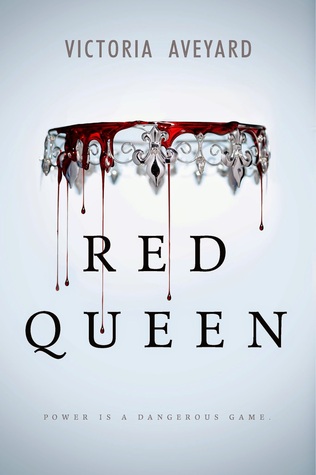 |
| *mourns the unfulfilled potential* |
Victoria Aveyard's
Red Queen was ridiculously hyped by its publisher, and I think there wasn't a single person in the YA blogosphere who wasn't looking forward to its release at least a little bit. Beautiful, dangerous-looking cover? Check. Gorgeous premise promising plenty of politics and intrigue and magic and blood? Check. Even I couldn't help but be swept up in the excitement.
When the book came out, book bloggers' reviews were all over the board. Some loved it and others loathed it. Still others could only react with a solid "meh." "Mixed reactions" is putting it lightly. But I pushed past my misgivings and borrowed
Red Queen from the library.
...and was roundly disappointed. Of course, I know there are many who would disagree, but I couldn't shake the feeling that I was reading a mashup of
The Selection and
The Hunger Games. The parallels were too blatant to ignore. The characters didn't appeal to me, and the prose felt more concerned with being quotable than actually telling the story in an interesting, effective way.
 |
| on the bright side, miyazaki gifs make literally every situation better |
4. A book that left you tossing and turning all night in anticipation of its release.
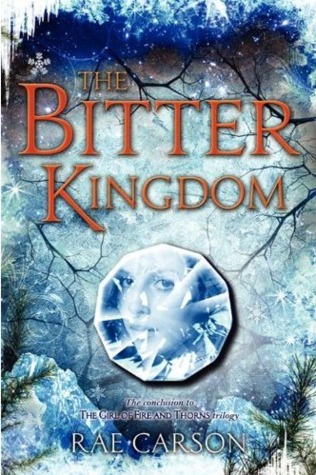 |
| it's been over two years since this brilliance entered the world! how time flies |
Despite how loudly I've trumpeted my love for it from the figurative Internet rooftops, Rae Carson's Fire and Thorns trilogy is still, in my honest opinion, criminally underrated. It's gloriously empowering in its unashamed display of feminism, body positivity, and diversity. It stars a tremendously brave, fierce heroine with an amazing head for politics and strategy. Its characters are achingly human and also deliver the best sarcasm and witty banter (Storm, I'm looking at you). Its magic system and worldbuilding are straight up awe-inspiring. So
of course I was eagerly anticipating the release of the final installment,
The Bitter Kingdom.
(Psst. Since it is a finished series and all... I think I've just picked out your next series binge read for you. I mean, no pressure. But.)
5. A book that has your dream ship.
 |
| IT'S ALWAYS A GOOD TIME TO SPRING STIEFVATER RECS ON MY UNSUSPECTING BLOG READERS |
While nearly all my ships are my 'dream ship' in some form or another, Sean Kendrick and Puck Connolly from Maggie Stiefvater's
The Scorpio Races are probably one of the pairings closest to my heart. Theirs is a relationship founded on mutual respect for each other's skills and admiration for each other's personalities. They help each other and are proud to see each other succeed and are willing to stick by each other through the thick and the thin. They're very different people who complement each other when they come together. Also, they're super in love but stubbornly refuse to acknowledge until near the end of the book, which makes for the slowest, most painful burn ever. Be still my shipping heart.
 |
| tfw you find no face scary but also identify with him? oops |
6. A book that would be your worst nightmare to live in.
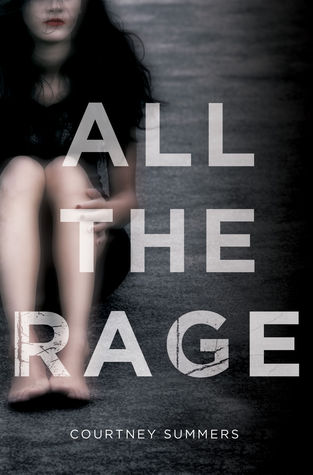 |
| what a mind-blowing, gorgeous, important, terrifying book |
All the Rage by Courtney Summers is a stunner in more ways than one. It's a devastating, insightful, no-holds-barred commentary on the poisonous rape culture that fills society today. It's the story of one flawed, hoping, heartbreakingly real girl trying to heal around the cracks in her armor. Its prose is as piercing as shards of glass, and it'll leave you angry and afraid and drained and so much wiser than you were going in. I'm not kidding when I say that I think this book should be required reading for every high school in the US. That said, the small town the book is set in is a nightmare for sure, and I'd hate to live inside this book. It's filled with narrow-minded people who are more inclined to defend the town's golden boy than listen to the girl he raped. The weather there is also really, really, really hot, and to say my heat tolerance is low would be an egregious understatement.
7. A book that reminds you of nighttime.
 |
| the cover and interior are almost as beautiful as the actual words |
I know, I know, you are all in awe of this most spectacular of cop-outs. THE WORD 'NIGHT' IS IN THE TITLE. In all seriousness, though, Erin Morgenstern's
The Night Circus is one of the most gorgeously atmospheric and all-around brilliant books you'll ever read. I push this book at
everyone, and for good reason (though to be fair, my book recommendations are always for good reasons *flips hair*). With a lovely and layered cast of characters, a whole lot of flawless prose, and a lushly magical yet mysterious ambience, it truly evokes the enchantment and splendor of nighttime. Plus, the premise is to die for and the settings are all so well-done. What's not to love?
8. A book that had a nightmarish cliffhanger.
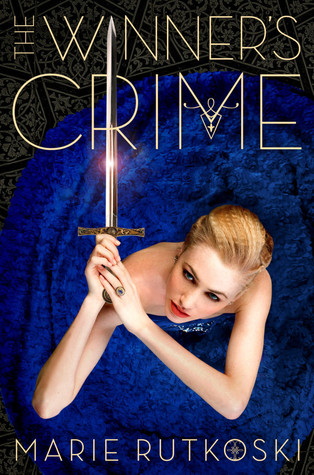 |
| forever confused about the color of kestrel's dress |
I kind of just want to scream "EVERY YA SERIES EVER," but I know that's not rational. So. I'm going to pick Marie Rutkoski's
The Winner's Crime, the second book in The Winner's Trilogy. I'm not going to tell you all about the ending to the book, obviously, but suffice it to say that it left me completely broken. It was emotionally taxing for me, brutal for the characters (especially my queen Kestrel), and so gorgeously written it was absolutely UNFAIR. I have zero idea how book three is going to use all the ridiculous and terrifying plot threads slammed into my face at the end of book two. Honestly, I am so afraid to try and pick up the pieces of my heart with the last book of this series, because the ending of the second book alone did so much damage.
Basically, I'M CONSTANTLY LOWKEY SCREAMING BECAUSE I NEED
THE WINNER'S KISS.
 |
| what did i tell you about miyazaki gifs |
9. A book you actually dreamt about.
 |
| deliberately looked for an image of the new american editions because i personally loathe the old ones |
I read the
Harry Potter series in around second grade and haven't really been able to get back into the fandom since (which I know is going to earn me some glares from my blog readers). But that meant that in elementary school, I had several rather vivid dreams centering around elements of the series. The most memorable and strange one involves Lord Voldemort attempting to murder me in the nursery where Lily Potter was killed—only his killing curse keeps missing me, because I am surrounded by small polar bears running around me in frantic circles. Honorable mention goes to the one dream I had about making friends with Lord Voldemort over tea.
(This is the same brain that my writing comes from! Come to think of it, that explains a lot.)
10. A book monster you wouldn't want to find under your bed.
(Mild Throne of Glass spoilers; proceed with caution!)
 |
| i love how literally none of the cover illustrations actually look like aelin and yet literally no one cares |
Okay, real talk: Sarah J. Maas's
Throne of Glass series contains some seriously frightening monsters. I mean, it could be argued that a lot of the main cast members are monsters themselves. (You know you're in for bloodshed in a book when the heroine is described as, and I quote, a "fire-breathing bitch queen.") Plus, if you ever find an Ironteeth witch like Manon Blackbeak under your bed, you know you're not long for this world. And then there are all the other monsters faced by the main characters! Valg princes, Wyrdhounds, skinwalkers, that strange and enormous lake thing from
Heir of Fire—I just. The monsters in this series are terrifying, but then again, any good high fantasy series needs to have something scary with very sharp teeth.
TL;DR if you find a ToG monster under your bed, you're about to be sliced into very tiny pieces and probably eaten. Run.
 |
| bless whoever made this gif tbh. also, more miyazaki |
So, my grand return. Let's talk books + odd sleeping habits in the comments!
I also wanted to give a shoutout to the lovely Leah Bauer @ Heart Full of Ink, who tagged me for the Halloween Book Tag. While I won't be putting up a post, as the season has come and gone (alas!), I'm very grateful that she thought of me and encourage you to check out her blog!
I'm not tagging anyone in particular—I feel like I've been doing a lot of tagging—but if any reader would like to steal this for their blog, go right ahead!



















